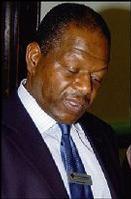Dennise Williams, Staff Reporter

Milton Brady, managing director of FirstCaribbean International Bank at FirstCaribbean's media luncheon at the Hilton Kingston Hotel, New Kingston on Monday. - RICARDO MAKYN/STAFF PHOTOGRAPHER
MANAGING DIRECTOR of FirstCaribbean International Bank (Jamaica) Limited, Milton Brady, has joined the fray in the ongoing debate over interest rate spreads. "In this interest rate debate, more heat than light is being shed," he declared while speaking a media luncheon organised by the bank at the Hilton Hotel, New Kingston, on Monday.
He pointed to the Net Interest Margin (NIM) line item of FirstCaribbean's profit and loss statement. "The NIM is the difference between the interest rates on loans and on the savings' rates you pay depositors. In our case, it is 7.1 per cent for the quarter ending January 2005.
"A typical bank has a cost to income ratio of 60 per cent. That means 60 per cent of the 7.1 per cent goes for operating costs. That leaves 2.9 per cent. From that figure, you have to take out credit losses ... and corporate taxes." And, after these expenses, "there is a profit of only 1.8 per cent that is returned to shareholders. And not the double digit returns alleged by certain interest groups".
LENDING RISKS
Mr. Brady cautioned that individuals who want to push interest rates down did not take into consideration the international aspects shaping the interest rate regime. "The interest rates differential between Jamaica and Trinidad and Tobago is not plucked from the air. One has to consider the risk in lending, the return on investment and inflation. Jamaica has a B rating by international credit rating agencies, meaning that we are high risk. You just have to look back at the FINSAC years to see why we are viewed this way. Then there is the high inflation rate of 13 per cent that we face. Viewed together, these three considerations are added on to the premium when interest rates are determined."
While he defended the credit policies of his bank, Mr. Brady noted that Jamaican businesses must look outside of the local commercial banking sector for their financing requirements. "There are many large businesses that source their money outside of Jamaica. Many of them borrow in US dollars at interest rates of six to ten per cent. However, they must have good credit and earn US dollars," he noted. It is not the policy of commercial banks to advance U.S. dollar denominated loans to businesses which earn Jamaican dollars since that could "lead to bankruptcy of the businesses if devaluation occurs", he said.
An additional source of funding for large enterprises is the capital markets. "You don't have to borrow at 20 per cent. If you have strong financials and a good management team, you can invite the public to become part owners of your business. Just recently, a company that made such an offer was oversubscribed by 300 per cent," said Mr. Brady. For those medium enterprises that cannot access US dollars, there is the Development Bank of Jamaica and the ExIm Bank.
However, credit will only be extended to qualified companies. A point belaboured by banking executives is the refusal of Jamaican businesses to provide business plans as well as audited financials. "To access these loans, companies must have audited financial statements. And your accounts must be solid. You can't be highly leveraged and expect to get more money. Also, a proper business plan is required. Only well run businesses will gain access to alternative funding."
Mr. Brady took umbrage at the campaign being waged by the JMA and the JAS to get commercial banks to lower their lending rates. "Speaking also as a member of the Jamaica Bankers Association, it is very troubling to us the way the situation is being handled. We believe that people have agendas," he argued.











